Why Are My Brakes Squeaking? 6 Possible Reasons
-
Pete Ortiz
- Last updated:
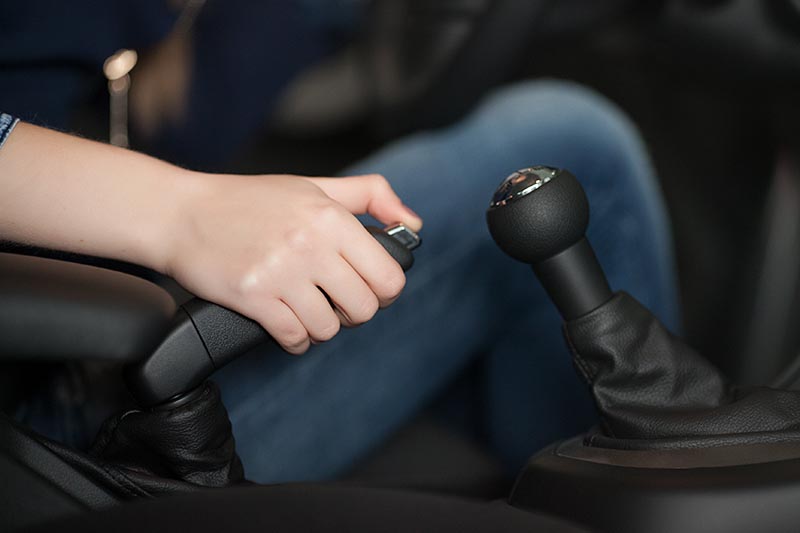
As a car owner, you might have noticed a squeaking sound coming from your brakes one when driving on the road. Usually, this sound is produced when one is pressing down the pedal to slow down or completely stop. The most common reasons include thinning brake pads, the high moisture content in the rotor creating rust, insufficient lubrication, and high metal content in cheaply produced brake pads.
Since not everyone has basic car maintenance experience, it’s hard to tell if the squeaking noise indicates a more serious underlying issue with the braking system or if it’s just a common noise from the brakes. Understanding the reasons behind squeaking brakes is vital because it helps narrow down the possible culprits to fix your car before a complete brake system failure.
Read on to learn more about why brakes squeak and how to fix the problem.
The 6 Reasons for Squeaking Brakes
Usually, weird noises emanating from your vehicle are a warning sign that you may be dealing with an underlying internal issue. Some of the noises could be caused by simple issues, which can be solved with a few quick and easy fixes. However, there are situations where the noises can indicate a more severe issue that warrants immediate attention.
According to car experts, there are six common reasons your car makes weird noises when you step on the brake pedal. We have summarized them below.
1. Brake Pad Issues
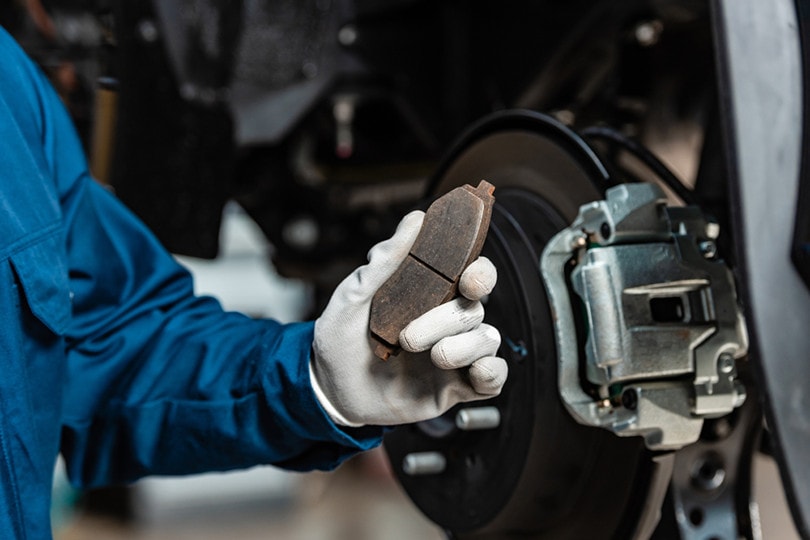
This is perhaps the most obvious reason why there is a squeaking sound coming from your braking system. Essentially, brake pads are installed in a car to create friction that makes the vehicle slow down and eventually stop. With frequent usage, the brake pads tend to lose their thickness up to a point where the thickness is not enough to create enough friction.
Most brake pads are equipped with a mechanical wear indicator that notifies you when it is time to replace the brake pads. Once the pads are worn out past their service life, the brake rotor will make contact with the indicator. At this point, pressing the brake pedal will produce a squeaking sound. This is a strong indication that your brake pads need immediate replacement because you might not be able to slow down and stop your car in emergencies. However, if you replace the brake pads and the squeaking noise continues, then you might be dealing with a bigger issue.
2. Problems With Dust and Debris
Sometimes the squeaking noise could be caused by something as trivial as dust and debris settling on the brake pads and rotors. Fortunately, you can solve this issue by pressing the brakes several times as you drive to shake the particles off the braking system.
However, if your car sits in a dusty environment like a shed for a long time, the debris and rust can get stuck on the brake pads. You can solve this issue by sending out the brake pad layers to remove the dust and debris.
Unfortunately, if your brake pads have lost their thickness, this solution will not work. You can easily reach the metal components rendering the braking system ineffective and unable to perform at optimum levels. So, your mechanic should be the one to examine the brake pads to determine whether sending them out will help eliminate dust and debris from the surface. If not, you might have to replace the brake pads.
3. Moisture Related Problems
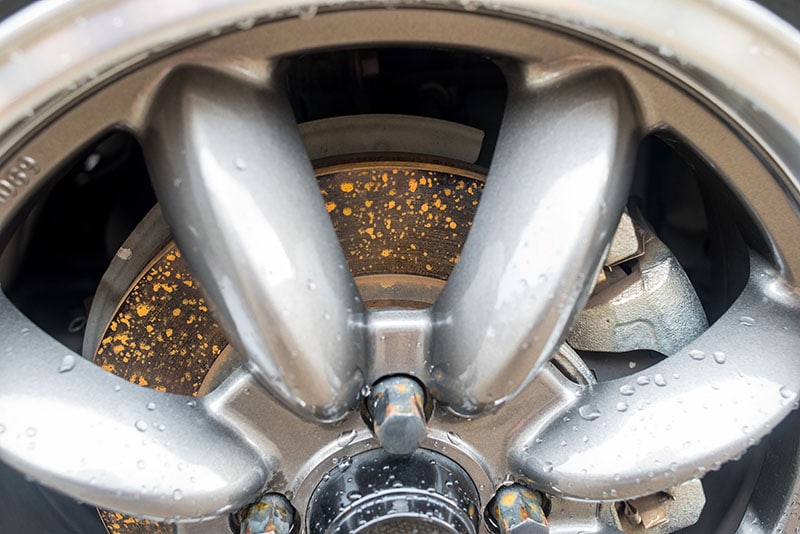
Strange noises emanating from the braking system might be related to natural issues like moisture build-up. If your car has not run for a while, if you start it up and hit the brakes, it might start to squeak. This is a normal reaction in the morning because moisture builds up and forms rust on the rotor when a car is not in use.
The rust particles can lodge themselves on the brake pads so that when you use the rotors, the rust pieces fall off, which inhibits the brake’s performance. When you press the brake pedal, a squeaking sound will be produced. While squeaking brakes due to rust may be common, it is not a serious issue.
Usually, letting your car run for a while or making hard stops can help remove the rust in just a few days. However, you will need to avoid driving over puddles and other moisture sources before the rust is removed from the braking system.
4. Driving Habits
According to automotive experts, being gentle as you drive your car is one of the best ways to increase its longevity. You also must use the right approaches and methods when using the car’s components. Some bad driving habits can lead to a whole host of car problems, like squeaking in the brakes.
For instance, driving habits can significantly reduce the effectiveness of brake pads, which can lead to weird noises in the braking system. Brake pads are components that drivers interact with the most. So, applying the brakes slightly continuously as is typical in traffic, will polish the discs to a mirror-like surface.
Also, panic-stopping can glaze your brake pads, thus giving them a glossy finish. The glaze will cause your car to squeak whenever you press the brakes.
Fortunately, most mechanics can fix this issue with sandpaper to remove the glossy surface. However, the best fix is to change how you drive on the road. Avoid slamming on the brakes and performing sudden stops unless in emergencies. Improper usage of the braking system can significantly reduce the lifetime of brake pads. You will be forced to pay extra for unnecessary repairs for car components that would have otherwise lasted longer if you practiced proper driving habits.
5. Metallic Component Issues
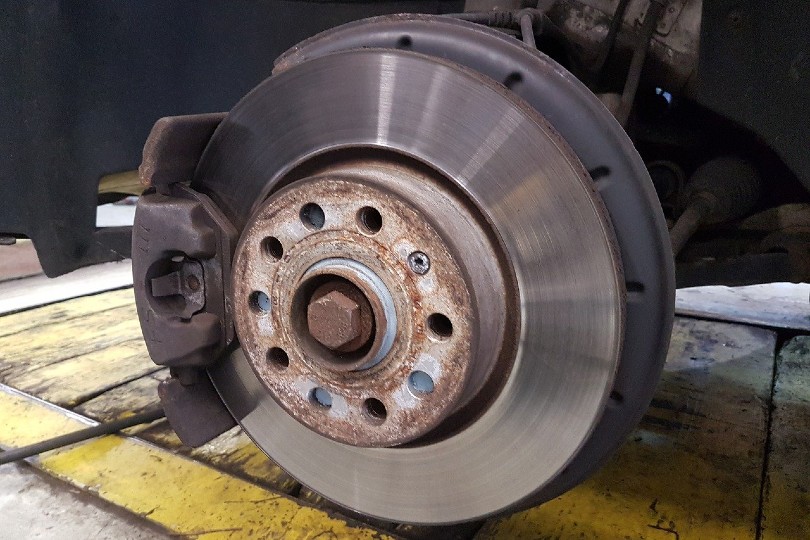
In some cases, a car may produce squeaking noises due to issues with the brake pad material. The brake pad can be made from various materials, including ceramic, organic, and semi-metallic components. The metals used in brake pads include copper, iron, and steel.
When these metal fiber components interact with the rotor, they might produce a squeaking noise. This is mostly due to the design of the pad or manufacturing defects, where metal fibers are placed too close to each other. In such a case, the proximity of the rotor to the brake pads creates a squeaking noise.
As you continue driving your vehicle, the metallic brake pads tend to wear out up to a point where they stop producing weird noises. So, it’s best to regularly monitor your brake pad behavior to see if the squeaking noises reduce as you keep driving. If the noise persists, you might have to consult a mechanic to confirm if the issue is happening for other reasons.
6. Insufficient Lubrication
The braking system is made up of various moving components that interact with each other to slow down a car or stop it. These moving components require some lubrication to reduce friction. Failure to provide enough lubrication will lead to the brake components grinding on each other, thus causing friction which produces the squeaking sound. The friction could also create a whole host of other problems in your car.
Fortunately, you can prevent frictional issues by using brake fluid or brake oil to lubricate the braking system continuously. Failure to provide enough lubrication will lead to overheating, which can make driving very dangerous. Therefore, ensure that you regularly inspect your braking system and follow the owner’s manual guidelines on how to check, flush and replace the brake fluid. After driving your car for a while, the brake fluid might not be able to lubricate the brake pads.
Can You Drive With a Squeaking Brake?
It depends. First, you must confirm whether the squeaking noise is a result of minor issues such as overnight moisture build-up or accumulation of dirt or debris on the rotor. For such minor issues, it shouldn’t be a problem to drive your car on the road with a squeaking noise. If anything, driving is what might help solve the issue.
However, if you confirm that the noise is brought on by a major issue such as faulty brake pads, do not even contemplate driving your car because you will not only put your life at risk but will also endanger the lives of pedestrians and your passengers.
It can be hard to ascertain whether the squeaking sound is caused by a minor or major issue if you are not well-versed in the inner workings of various car components. Therefore, you should consult your mechanic immediately if you notice strange noises coming from your braking system to confirm if the car is safe to drive in.
How to Fix Squeaking Car Brakes
So far, you should know that squeaking brakes are not always an indicator of a serious underlying issue. Sometimes, it is caused by minor fixable problems. Ignoring the noise can have dire consequences. So, what are the solutions for a squeaking braking system?
Lubricate the Contact Points Between Backing Plates
As mentioned earlier, brakes squeak due to insufficient lubrication between the contact points found at the edge of the braking pads. This is also the point where the calipers met with the pad clips. The other position that cannot function without lubrication is the slide pins (if they are available). Make sure you thoroughly clean the slide pins with a scotch pad or wire brush. Clean out the pin bore found in the caliper hanger using a wire bristle bottle brush, also known as a gun cleaning brush.
If the surface of the cavity is affected by rust, remove the corrosion with a drill. Just make sure the drill is slightly smaller than the bore size of the pin. Run the drill bit and insert it into the whole with your hands to loosen up some of the gunk and rust caked out on the surface. Once you have removed the rust, reapply the lubricant to the bore and pin. A word of caution, never lubricate the surface of the brake shoe or pad as it will reduce your braking ability.
Replace the Brake Hardware
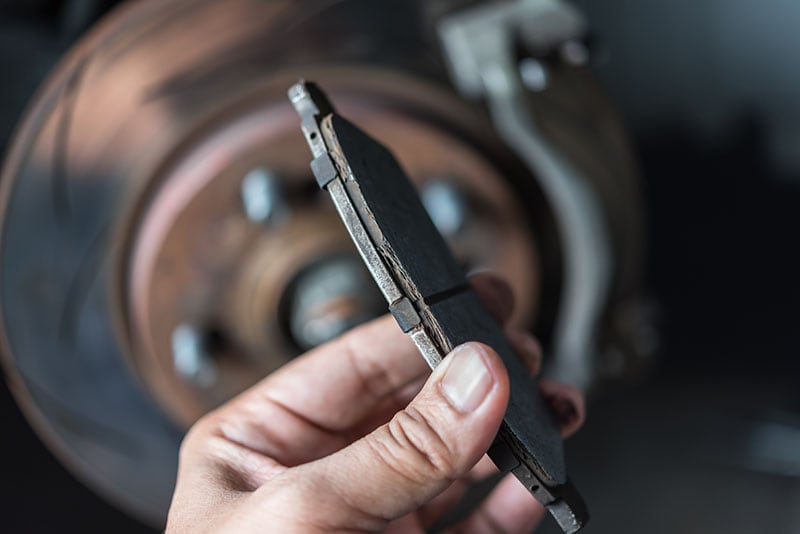
Whenever you change vehicle brake pads, change your braking system hardware too. This involves changing the pad clips, replacing damaged or cracked pin boots, and removing and cleaning the slide pins. If you did not purchase your brake pads with pad clip hardware, you can purchase them separately. However, it is cheaper and more cost effective to buy the brake pads that come with the brake hardware included.
Replace the Brake Pads
In some situations, brake pads might be the reason for your squeaking brakes. Whether issues in the brake pads are due to thinning out of the surface, the presence of contaminants, or have been glazed over, replacing the brake pads will solve them.
Experts recommend that you replace the rotors with new brake pads as well as the brake hardware. If your car has old rotors, you should have them machined and resurfaced. Granted, new brake pads may squeak for the first few days, but the sound should dissipate as you continue driving your car.
Conclusion
Hearing strange sounds emanating from your vehicle is a cause for concern. This is how the car communicates to the driver about possible underlying issues. If the squeaking noise is coming from your brakes, then there is a strong possibility there are issues with the braking system.
Usually, brakes squeal because of issues with the brake pads. These brake pad issues are brought on by insufficient lubrication, dust and grime build-up, night moisture, and glazing, among others. While some of the issues are solved by running your car, you should never drive if your brake pads are faulty or damaged.
Also, if your brake pads require frequent repairs, replace them and the brake hardware. Furthermore, you shouldn’t make assumptions about the severity of the issues. It’s best to consult your mechanic for a more professional diagnosis.
Featured Image Credit: Photos box, Shutterstock
Contents


